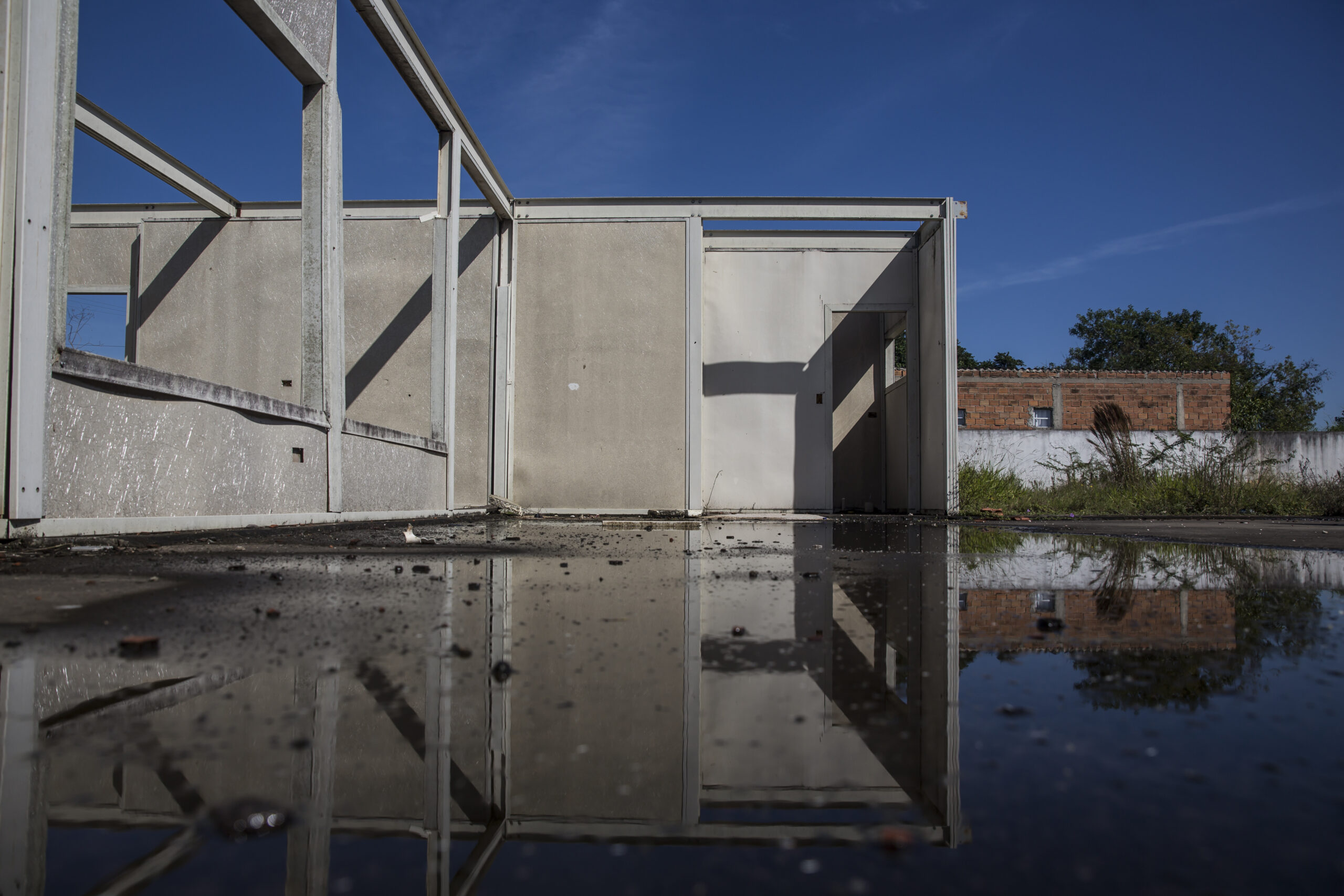To mark World News Day on September 28, 2022, the World News Day campaign is sharing stories that have had a significant social impact. This particular story, which was shared by Rádio Gaúcha Zero Hora (Brazil), was published on June 24, 2022.
In total, there are 9,700 projects that were not completed or ended up paralyzed in Brazil.
The problem of the works suspended by construction company MVC goes far beyond the Rio Grande do Sul territory. Today, there are 9,700 projects for children’s schools and sports fields unfinished or paralyzed in Brazil. Of these, 1,200 are from MVC, according to an audit by the Federal Audit Court (TCU).
In the initial phase of the Proinfância project, MVC received the most contracts in the country. It won a bid to build 1,241 daycare centers between 2013 and 2015. Most did not get off the ground. If in Rio Grande do Sul it concluded 6% of the 208 contracts, at the national level the performance was worse: 0.64%, according to the TCU. It was the least effective performance among the contractors that proposed an alternative construction method (Casa Alta made 2.7% of the contract, Consórcio PIB made 4.8% and Consórcio Concreto PVC, 5.9%).
Dissatisfied, city governments have resorted to the judiciary. The RBS Investigation Group (GDI) found 58 lawsuits regarding MVC’s unfinished daycare centers. They are being sued in nine states: Rio Grande do Sul, Sergipe, Bahia, Maranhão, Pernambuco, Piauí, Espírito Santo, Alagoas, and São Paulo. Almost all claim damages. Two procedures, one in Novo Triunfo (BA), and the other in Marechal Deodoro (AL), are under criminal courts. Its basis is alleged irregularities in the bidding process.
In Rio Grande do Sul, there are at least 21 municipalities suing MVC for damages. Some cities count up to four unfinished schools, promised by the company, such as Gravataí. In addition to this municipality, the report located federal court cases in Gramado, Farroupilha, Bom Jesus, Caxias do Sul, Nova Hartz, Tramandaí, Osório, Terra de Areia, Três Cachoeiras, Portão, Carazinho and Itaqui. All under civil courts.
The municipalities of Gravataí (BRL 4.2 million for six unfinished schools, four of them from MVC), Gramado, Bom Jesus and Farroupilha (BRL 240,000 per school, five in all, plus interest since 2015) have already won their case.
— The FNDE did not demand sufficient guarantees, and the works were concentrated from few companies. They were unable to comply with the agreement and the municipalities were left in the lurch — summarizes prosecutor Fabiano de Moraes, who worked for the Federal Public Prosecutor’s (MPF) in cases judged in the Serra region.
In State Courts, ZH found cases in Passo Fundo, Carazinho, Iraí and Sananduva. And investigations by the Public Prosecutor’s Office were reported in Ametista do Sul, Erechim, Erval Seco, Frederico Westphalen and Três Arroios.
Companies blame the government
In July 2017, MVC entered into judicial reorganization and changed its corporate name to Gatron Inovação em Compósitos. Gatron, which hired Carpena Advogados to file compensation claims against the federal government, reports that the problems began with a lack of funding transfers from the FNDE. MVC generated 6,000 jobs at the time, “which were compromised, due to the irresponsibility of the government”, according to the lawyers in a note. Today the company generates around 600 direct jobs.
“In 2014/2015, MVC held more than 10 meetings at the Ministry of Education, explaining the problem of default and requesting the resumption of works, under penalty of the company going bankrupt and the daycare centers not being delivered. At the time, the federal government had no resources to pass on to the municipalities. MVC spoke to more than five education ministers, but given the political instability at the time, lack of financial resources, the threat of impeachment of then President Dilma Rousseff, none of the conversations were fruitful. Every week, a minister would be replaced, including that of Education,” emphasized representatives of Gatron in a note.
Regarding the legal proceedings to which it responds, Gatron states that it has proven that it is “the victim of a disastrous management by the FNDE, which not only failed to comply with the agreement from the financial point of view, but also in meeting the specificities and problems faced by each municipality”.
Artecola, MVC’s largest partner until then, also claims that its financial problems came from the failure to fully transfer the amounts agreed by the federal government to the municipalities. It also mentions changes in the management of the FNDE. Artecola’s defense in the lawsuits has argued that several prefabricated school structures were not sent to the municipalities because city governments took a long time to deliver the land, which should have been previously leveled and ready for the work to begin.
According to a statement from Artecola, the company moved away from civil construction “as a result of the crisis that began with contracts signed by MVC with the government, involving the implementation of daycare centers under the ProInfância program. The Federal Government, through the FNDE and the MEC, did not honor its commitments, suspending payments for the project from the administration that took office with the new government in 2015. As a result, MVC was unable to fulfill its commitments, and Artecola, MVC’s guarantor at the time, was called upon in financial and labor claims.”
When contacted, Marcopolo declares that its shareholding in MVC was minority, just as an investor, without management power. And it clarifies that it has already been excluded from processes related to the topic. The company also reinforces that there is no final case in which it has been convicted.
The FNDE manifested with a note: “The FNDE administration informs that it was the responsibility of the municipalities to adopt appropriate measures in order to compel companies to carry out the works. The FNDE did not make any payment to MVC. The funds are transferred to the federated entities (municipalities), which hired the company. The FNDE is not competent to sue MVC for non-compliance with the contracts. It is up to the federated entities to file lawsuits, if necessary. The FNDE analyzes the rendering of accounts to evaluate the correct application of funds and the technical analysis to verify the execution of the works, in order to verify the fulfillment of the foreseen goals and the conclusion of the project objectives.” k for Early Childhood Education (Proinfância). This federal government project emerged in 2012 as a possible redemption for the dilemma of those who had nowhere to leave their children to go to work. Execution was just over halfway through.
In Rio Grande do Sul, the construction of 1,843 daycare centers and sports courts was planned. Of this total, 853 were not completed. For three reasons: either they were canceled (they only had a contract, the works did not even start) or they are unfinished (the contract ended before the construction was finished) or paralyzed (the construction stopped, but the contract is still in force).
When someone analyzes the skeletons of unfinished daycare centers that proliferate in Rio Grande do Sul, one name tends to pop up: MVC Componentes Plásticos. This company, which is undergoing judicial reorganization, started to build 41 daycare centers and never finished them. They represent 41% of the works interrupted in Rio Grande do Sul territory by the manager of Proinfância, the National Education Development Fund (FNDE), linked to the Ministry of Education (MEC).
The companies assure that the schools were unfinished because the federal government delayed all transfers of funds for the works. And also because municipalities did not comply with earthworks commitments. “More than 10 meetings were held at the Ministry of Education, explaining the problem of default and requesting the resumption of works. Nothing worked, the resources did not come”, emphasize representatives of Gatron (MVC’s new name), in a note to the editors.
The vast majority of FNDE works are made up of Proinfância children’s schools, but some are sports fields. Of the total of 853 projects that did not succeed in the state, 202 relate to MVC. Most did not even get off the ground, but 41 of these MVC daycare centers were started – and not completed. Of the 41, as the FNDE informed the editors, there are plans to redesign or resume 10. The others are abandoned.
The Federal Audit Court (TCU) is watching and has just approved a specific audit for interrupted MEC works across the country. Almost all of the abandoned buildings are children’s schools. Of the 9,700 suspended projects, around 2,300 had some structure started.
Even with these mishaps, Proinfância did more than it failed to do. 15,600 works were completed and another 3,600 are in progress. What is strange to the auditors, according to the court document, is that the federal government has prioritized the construction of 2,000 new schools recently, when there are so many unfinished constructions.
The RBS Investigation Group (GDI) researched federal government and municipal websites and found that MVC is the contractor that most promised and least fulfilled, among the contracts agreed with the FNDE. When the federal government launched the Proinfância bidding process in 2012, the state faced one of the worst deficits in early childhood education, with a need for more than 215,000 vacancies. MVC closed contracts to generate 19,400 vacancies in Rio Grande do Sul, with the construction of 208 of the 1,800 projects planned by the FNDE for the State (almost all daycare centers). But only 12 schools were completed (6% of the forecast), with a balance of 1,900 vacancies created. Other contractors also failed in the commitment, but MVC is the one that has fulfilled the fewest contracts, proportionately.
What happened? It is a long story. The federal government was in a hurry to tackle the deficit in early childhood education. In Rio Grande do Sul alone, 215,000 jobs vacancies to be created. Due to the need for speed, the first Proinfância bidding, carried out under the Differentiated Public Procurement Regime, had among the winners four companies that prepared innovative constructive proposals, which promised to conclude in less time and at a lower cost than conventional ones. One of them, MVC, won a bid to build 1,241 daycare centers in the country (208 of them in Rio Grande do Sul), by replacing bricks with a polymer (with fiberglass), a lighter material.
The method, which claims to be more agile and cleaner than traditional masonry, uses ready-made sheets fitted together. However, the construction company was not able to build the planned schools within the established deadline. It claimed financial difficulties due to lack of transfers of state funds and asked for price readjustments, not granted by the city administrations – which would also have failed to comply with other agreements, such as preparing land. MVC even committed to building 900 by 2015 and started more than 600, according to a report brought to the federal government that year. Then the works stopped.
The result is that, between 2013 and 2015, MVC concluded only 12 day care centers in the state. This occurred after part of the funds were allocated to the ventures. In addition to wasting public funds and the deterioration of the material wasted in the interrupted works, the communities were left without the daycare center vacancies that would be created in these almost 10 years.
The Federation of Associations of Municipalities of RS (Famurs) mediated meetings between mayors and representatives of the construction company, which undertook to resume work. But despite promises, the schools were not completed by MVC.
Some municipalities, with the help of federal funds, abandoned the alternative method and, in many cases, used their own resources to complete the schools, hiring other contractors, in addition to obtaining assistance renegotiated with the FNDE. The worst thing is that in many cases these construction companies signed contracts to complete the interrupted works of MVC and also did not complete the service.
— Mayors struggled to complete daycare centers when MVC left them incomplete. They managed to complete 160 of the 202 projects agreed by MVC. They did this with their own resources, in the most advanced buildings, and with funding from the FNDE in the others. In relation to the 41 interrupted constructions, many are so deteriorated that lack conditions for conclusion — says Márcio Biasi, Education Coordinator at Famurs.
In some cases, city administrations that resumed work had to redo the entire structure, because MVC’s technology is not compatible with conventional bricklaying, says Biasi. The mayor of the coastal town of Terra de Areia, Aluísio Teixeira, confirms this. MVC abandoned a daycare center construction in that municipality when it had 34% of the work completed. The structure rusts in the open, and the municipality filed a lawsuit for damages against the company. The intention is to use the land for a new day care, but only after they manage to win the lawsuit. In the meantime, the city pays rent for rooms for small children to stay.
— Not even the foundations of the unfinished daycare can be used more, because the innovative material proposed by MVC does not support the weight of concrete or bricks. We will have to start from scratch,” laments the mayor.
The work was budgeted at BRL 790,000 and, according to the FNDE, two transfers of BRL 197,000 each were made. The building rots in the open.
The Federal Audit Court (TCU) even considered that MVC would be declared unsuitable and prohibited from participating in federal bids for five years, but the measure was not adopted. Pressed by debts, the company entered into judicial reorganization in 2017.
The corporate name MVC was changed to Gatron Inovação em Compósitos, whose headquarters are in São José dos Pinhais (PR). MVC is a corporation whose shareholders included the Rio Grande do Sul companies Artecola (74%) and Marcopolo (26%). Marcopolo alleges that it withdrew from society before the daycare project.




